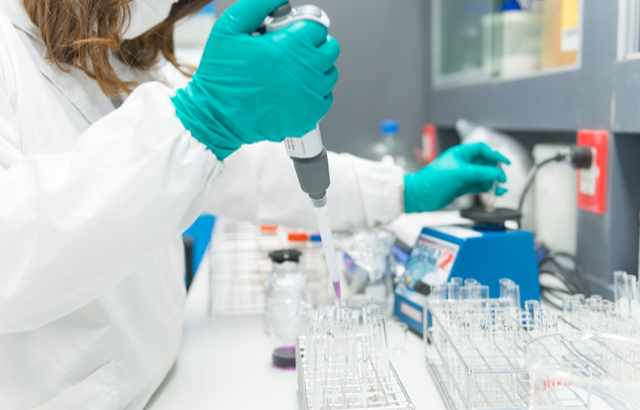

Before the BHF was founded in 1961, very little dedicated funding was available to support research into heart and circulatory diseases. We set about changing that. Over the past 60 years, BHF support has enabled the training of generations of researchers and supported world-leading scientists to make discoveries that have helped save and improve people’s lives.

In 1961, one of our first aims as a new charity was to appoint BHF Professors across the UK, each internationally recognised for their research, who would build talented teams around them. This created a solid foundation from which we set out to support the brightest researchers towards becoming the next generation of world-leading scientists. To do this, we introduced research fellowships in the 1960s and PhD studentships in 1981. Since 1990, we’ve supported the training of nearly 2,000 PhD students throughout the UK.
“Our biggest asset is our talented and dedicated researchers,” states our Associate Medical Director for Research Professor Metin Avkiran, “I'm very proud to say that the BHF currently funds 260 PhD students, at 31 universities across the UK. By doing this, we nurture the future research leaders, with the conviction that these bright scientists will drive new discoveries that go on to save and transform lives in decades to come.”
The next generation
We invited two current PhD students, Alex Ainscough from Imperial College London and Amanda MacCannell from the University of Leeds, to talk at our October Live & Ticking event. Alex and Amanda are both in their final year of the BHF 4-Year PhD Programme.
Alex’s research focuses on pulmonary arterial hypertension, a chronic and debilitating condition which damages the blood vessels in the lungs, leaving patients feeling breathless and lethargic. “Damage to small blood vessels in the lungs causes increased pressure in the larger lung blood vessels (pulmonary arteries), which then puts extra strain on the heart. The right side of the heart is not equipped to deal with this kind of pressure and eventually the heart fails, which is the ultimate cause of death in this disease,” Alex explains.
Alex has taken an innovative approach to studying this condition by developing ‘organ-on-a-chip’ models. Rather than looking at the entire organ, Alex focuses on modelling key aspects of organs by recreating their tissue architecture. In doing this, important mechanical functions such as flow can be mimicked, enabling Alex to test drugs and explore the potential for personalised medicine. In collaboration with AstraZeneca, Alex is testing both already approved and experimental drugs in the AZ PAH drug development pipeline.
 Amanda, on the other hand, is researching how fat communicates with different cells and organs of the body, and how diabetes affects this communication. Having previously studied fat in hibernating squirrels, Amanda is interested in applying her knowledge to a human model. “When fat is working properly, it’s used to store excess lipid. When fat stops working properly, that excess lipid ends up in other organs like the heart or liver. I’m investigating how obesity and diabetes can trigger fat to release certain signals which make our organs go into hyperdrive or confusion, causing fat to be deposited in different areas of the body,” Amanda explains.
Amanda, on the other hand, is researching how fat communicates with different cells and organs of the body, and how diabetes affects this communication. Having previously studied fat in hibernating squirrels, Amanda is interested in applying her knowledge to a human model. “When fat is working properly, it’s used to store excess lipid. When fat stops working properly, that excess lipid ends up in other organs like the heart or liver. I’m investigating how obesity and diabetes can trigger fat to release certain signals which make our organs go into hyperdrive or confusion, causing fat to be deposited in different areas of the body,” Amanda explains.People with diabetes are twice as likely to suffer a stroke and three times more likely to have a heart attack. While diabetes has several causes, being overweight is one of the main risk factors. “Obesity is a complex social, physiological, and medical issue that is a lot more than just calories and exercise, which is why we need to find a unique scientific solution. If we can find a way to block these damaging signals and try to restore proper fat function, it might be possible to reverse obesity and diabetes,” says Amanda.
Supporting essential research
“When the pandemic hit, everyone was unsure about what the future might hold and early career researchers in training were particularly anxious about the impact on their work and prospects. The BHF responded rapidly to offer extensions of up to 6 months to PhD studentships. This quick response provided a lot of relief, and the extension to my studentship has enabled me to finish my final programme of work. I’m incredibly grateful to the BHF for supporting me through that period,” says Alex.
Research has always been at the heart of what we do and will continue to be at the top of our priorities. Over half of all non-commercial research into heart and circulatory diseases in the UK is BHF-funded. Since we were founded 60 years ago, the annual number of deaths from heart and circulatory diseases in the UK has halved. Nevertheless, as Professor Metin Avkiran states, “We cannot be complacent because, even today, heart and circulatory diseases still kill 1 in 4 people in the UK and cause 45,000 premature deaths each year. However, with ongoing investment in research, science will continue to illuminate the way and new ways to prevent and treat these devastating conditions will be found.”


